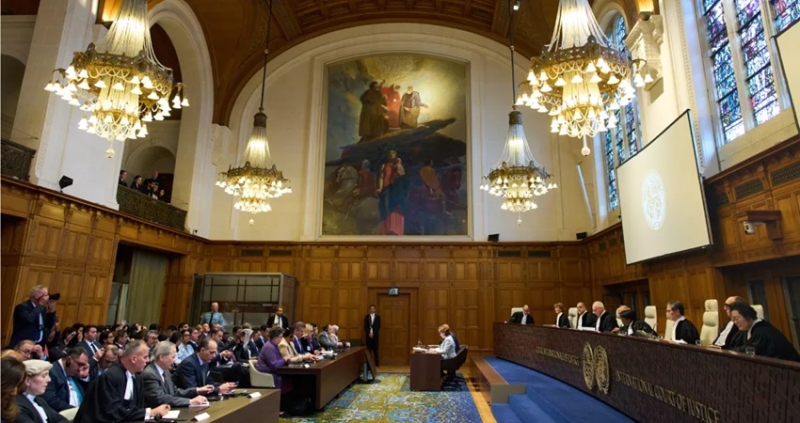- FAO Warns of ‘Silent Crisis’ as Land Loss Threatens Billions |
- Indices tumble on both bourses amid broad-based sell-off |
- BNP Names 237 Possible Candidates for Polls |
- Bangladeshi leader of disabled people of world Dulal honoured |
- UN Report Warns Inequality Fuels Global Pandemic Vulnerability |
ICJ Orders Israel to Allow UN Aid Agency Access to Gaza

The International Court of Justice (ICJ) on Wednesday ruled that Israel must allow the UN Relief and Works Agency for Palestine Refugees (UNRWA) to deliver humanitarian assistance to Gaza.
The advisory opinion followed a request from the UN General Assembly last year, seeking clarification on Israel’s legal obligations after it barred UNRWA — the main humanitarian agency operating in Gaza — from continuing its work.
ICJ President Yuji Iwasawa stated that Israel is legally required to permit and facilitate relief operations by the United Nations and its agencies, including UNRWA.
The court’s opinion came as a fragile US-brokered ceasefire, which took effect on 10 October, continues to hold in Gaza.
Israel has denied any violation of international law, describing the court’s proceedings as biased. Although it did not attend the hearings in April, Israel submitted a 38-page written statement for consideration.
In a response issued by its Ministry of Foreign Affairs, Israel rejected the ICJ’s findings, claiming it “fully upholds its obligations under international law.” The statement added that Israel “will not cooperate with an organisation that is infested with terror activities,” referring to UNRWA.
UNRWA has been effectively banned from operating in Gaza since January. The agency has faced heavy criticism from Israeli Prime Minister Benjamin Netanyahu and his far-right allies, who accuse it of being infiltrated by Hamas — allegations the organisation firmly denies.
According to Iwasawa, the ICJ found that Israel had failed to substantiate those claims. The court also ruled that the Gaza population had been “inadequately supplied” and that Israel was obligated to ensure “the basic needs of the local population” are met.
Representatives of the Palestinians welcomed the decision. Palestinian Ambassador to the Netherlands Ammar Hijazi described the ruling as “clear, unequivocal and conclusive,” saying it left Israel with “no pretext, no context, no excuse” to block UNRWA’s operations.
In its submission, Israel had argued that the court should reject the UN General Assembly’s request, claiming it was repetitive of previous opinions and that judges lacked the fact-finding authority to make such determinations.
In an earlier advisory opinion, the ICJ declared Israel’s presence in the occupied Palestinian territories unlawful and called for an immediate halt to settlement construction — a decision that bolstered international calls for recognition of a Palestinian state.
Israel rejected that opinion, arguing it ignored its security concerns. Similarly, two decades ago, the court ruled that Israel’s West Bank separation barrier violated international law, a proceeding Israel boycotted as politically motivated.
Although advisory opinions are not legally binding, they carry significant moral and legal weight, influencing international law and policy.
Wednesday’s opinion is separate from the ongoing genocide case brought by South Africa, which accuses Israel of committing genocide in Gaza — a charge Israel has dismissed, accusing South Africa of providing political cover for Hamas.
Separately, the International Criminal Court (ICC) has issued arrest warrants for Israeli Prime Minister Netanyahu and former Defence Minister Yoav Gallant, accusing them of using “starvation as a method of warfare” and deliberately targeting civilians — allegations Israel strongly denies.
The ICJ opinion reinforced this point, stating that Israel “is not to use starvation of the civilian population as a method of warfare.”
Legal experts said the ruling strengthens the case against Netanyahu. “The opinion provides strong legal support for the case against him,” said Tom Dannenbaum, Professor of Law at Stanford University.
The Gaza war erupted after Hamas launched a surprise attack on southern Israel on 7 October 2023, killing around 1,200 people, mostly civilians, and taking about 250 hostages. Israel’s retaliatory assault on Gaza has since killed more than 68,000 people, according to Gaza’s Health Ministry.
The ministry’s figures, widely considered credible by UN agencies and independent experts, do not distinguish between civilians and combatants. Israel has disputed the numbers but has not released its own estimates.

